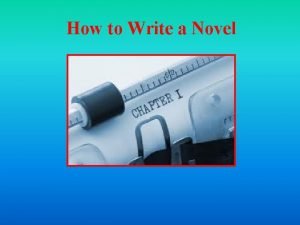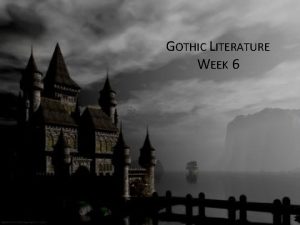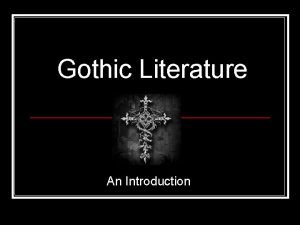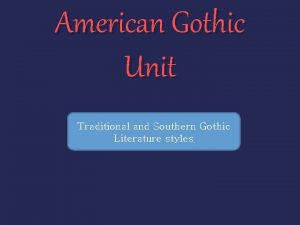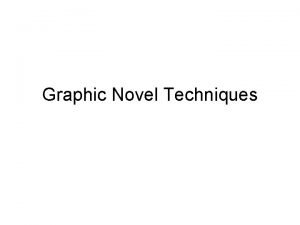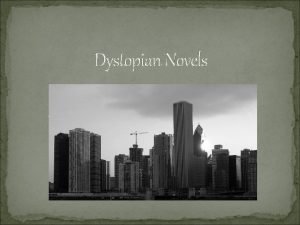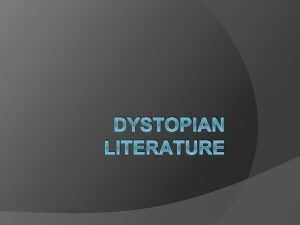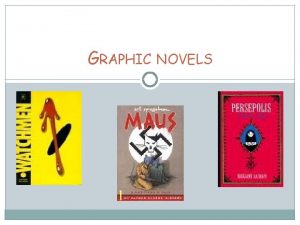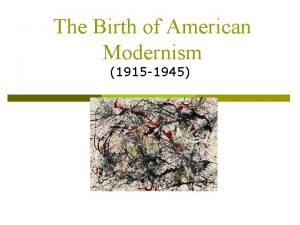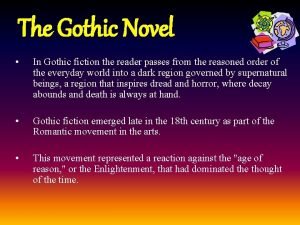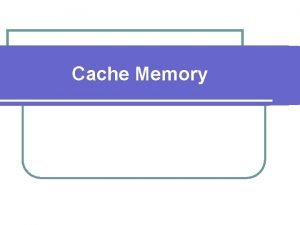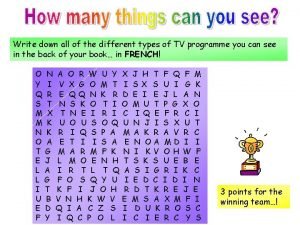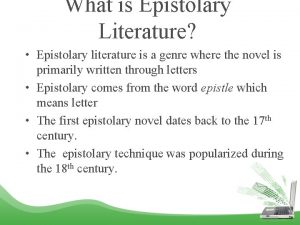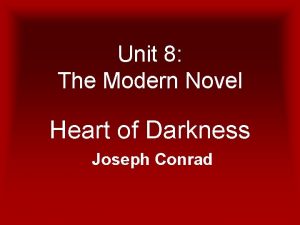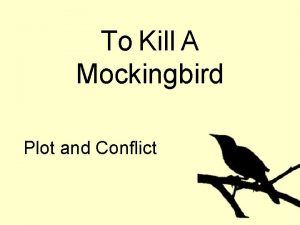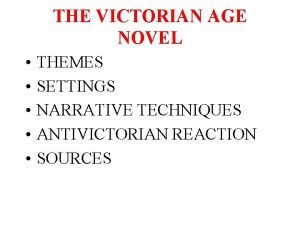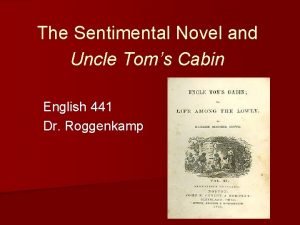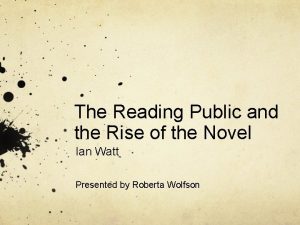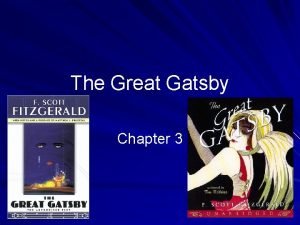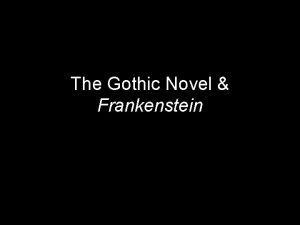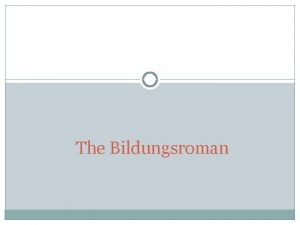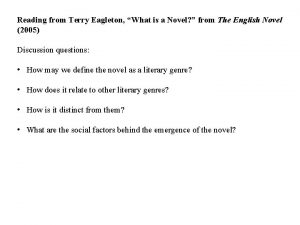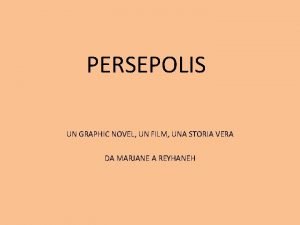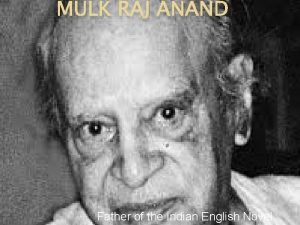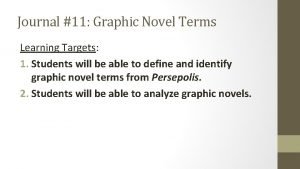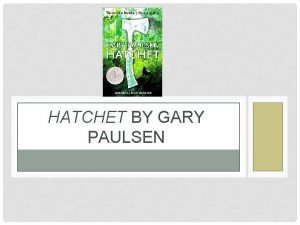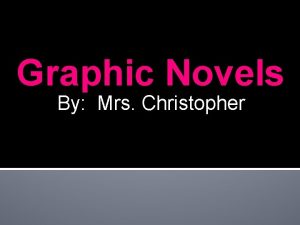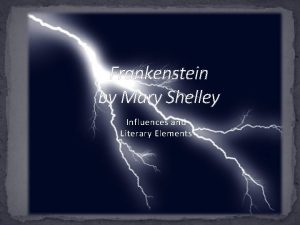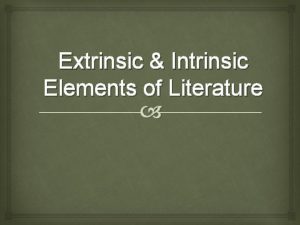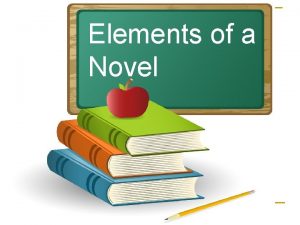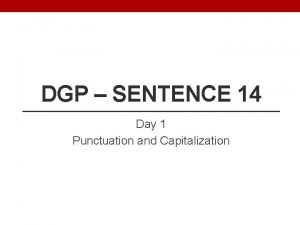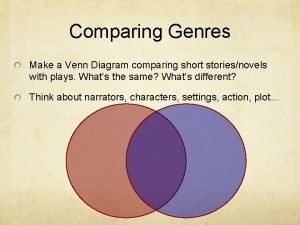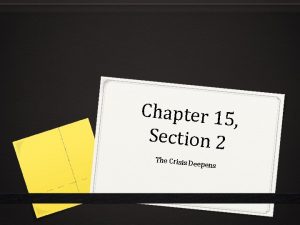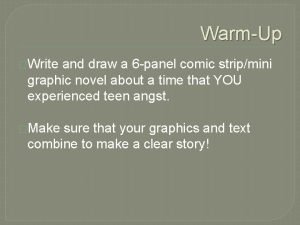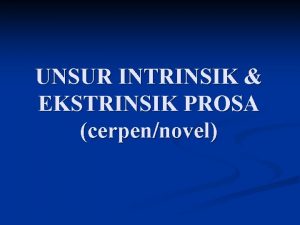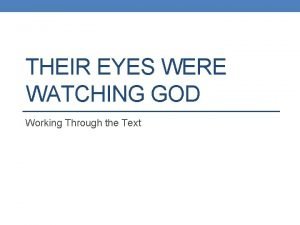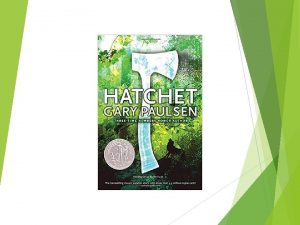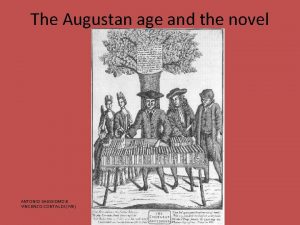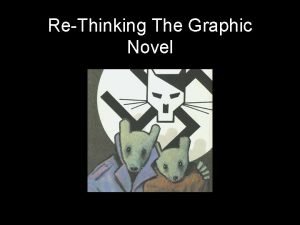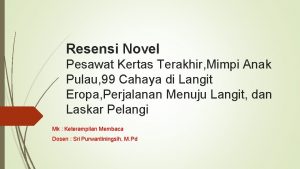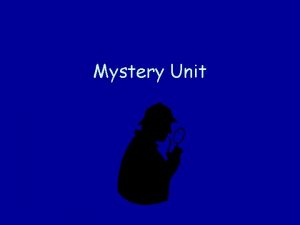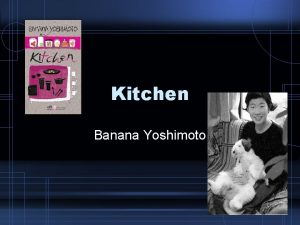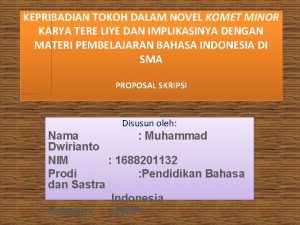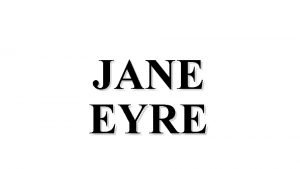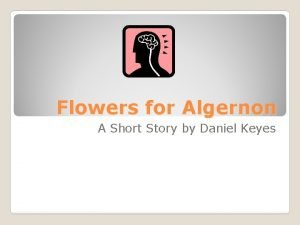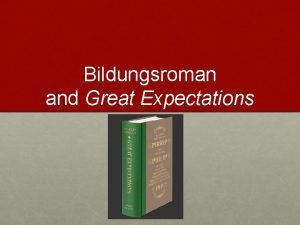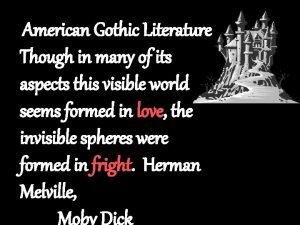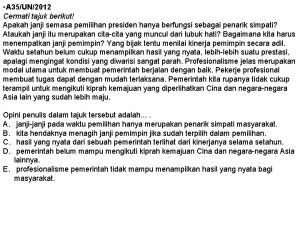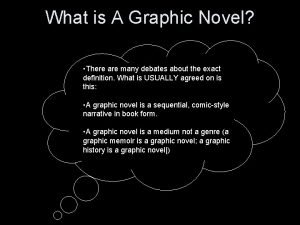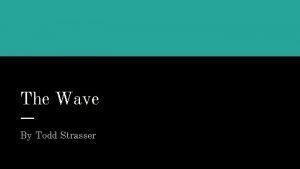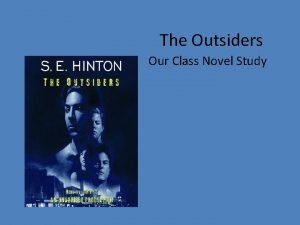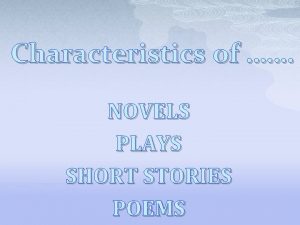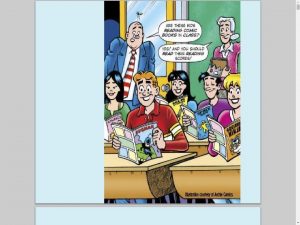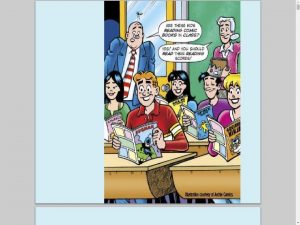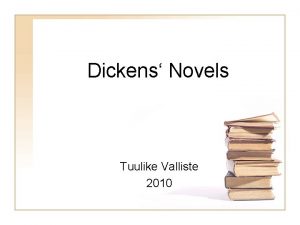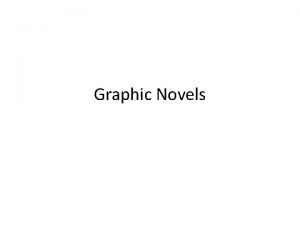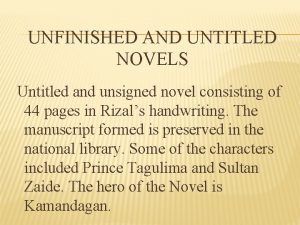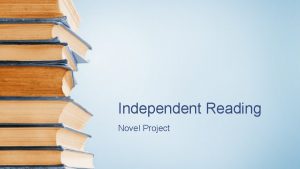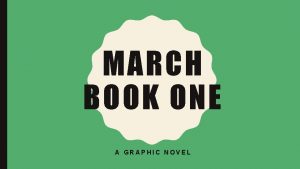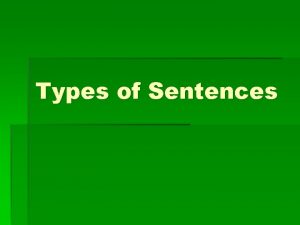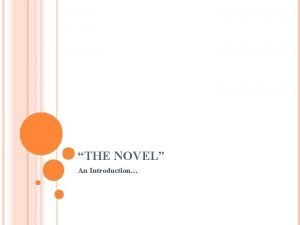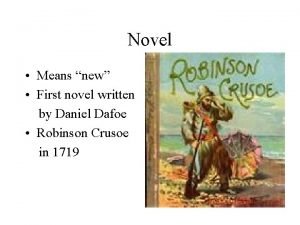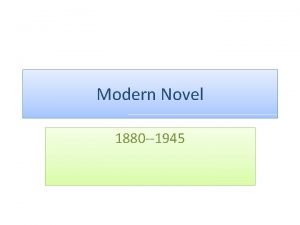How to Write a Novel Types of Novels









































































- Slides: 73

How to Write a Novel

Types of Novels Fiction is divided into many genres. This kind of classification helps readers find the types of novels they like to read. For example, readers who are mainly interested in love stories can go straight to the "Romance" section of the library.

Major Genres Mysteries - A mystery is about a crime, usually a murder, and the process of discovering who committed it. The hero(ine) is usually a detective or an amateur doing detective work. Click below to read more about writing mysteries. http: //www. creative-writing-now. com/how-to-writea-mystery. html

Science Fiction Science fiction novels imagine possible alternatives to reality. It is reality + "What-if. " For example: What if the world ended? What if there were life on other planets? The imaginary part of science fiction is based on known scientific facts. For example, if there is time travel in a science fiction book, it would be done with technology, not by waving a magic wand. To read more about writing science fiction, click on the link below. http: //www. creative-writing-now. com/how-to-writescience-fiction. html

Fantasy Like science fiction, fantasy is about imaginary worlds. But the imaginary part of fantasy novels usually involves magic, where the imaginary part of science fiction involves science or technology. To read more about writing fantasy, click on the link below. http: //www. creative-writing-now. com/how-to-writefantasy. html

Westerns normally take place in the Western U. S. (although sometimes in other locations), most often during the 19 th century. Common elements include cowboys, ranchers, the difficulties of frontier life, frontier justice, and conflicts between natives and settlers.

Horror fiction gets its name because it is focused on creating emotions of terror and dread in the reader. Horror fiction often accomplish this through the use of scary supernatural elements or gore. To read more about writing horror, click on the link below. http: //www. horror. org/horror-is. htm

Thrillers Like horror, a thriller gets its name because of the feeling it creates in the reader. Thrillers are designed to make the reader's pulse race, to keep him or her turning pages. Often thrillers are about a crime that is going to be committed or a disaster that is going to happen. . . if the hero(ine) doesn't prevent it. To read more about writing thrillers, click on the link below. http: //www. creative-writing-now. com/how-to-write-athriller. html

Romance fiction is about love and passion. Normally, the focus is on two characters who fall in love but have problems or obstacles keeping them apart, and there is a happy ending. To read more about writing romance, click on the link below. http: //www. creative-writing-now. com/how-to-writeromance. html

Historical Fiction Historical fiction novels are set in a past time period, normally at least fifty years before they were written. They combine a made-up story with realistic details of that time period. To read more about writing historical fiction, click on the link below. http: //www. creative-writing-now. com/how-to-write-historical -fiction. html

Elements of a Novel Characters are the imaginary people you write about in your fiction or drama. Examples of fictional characters: Harry Potter, Hamlet, Oliver Twist, Cinderella. The main character of your story is called the protagonist.

Inventing Your Characters Where do fictional characters come from? Some places to start: • Someone you see on the street or in the supermarket. Imagine a life for this person, and you've got a fictional character. • Take a picture of a person in a magazine. Invent a name for him or her, a personality, hopes and fears, annoying habits. • Open the phone book to a random name. Let's say you come up with "B. Goulding. " What might the "B. " stand for? Write down the first thing that comes to mind; for example, Bertha. When you imagine someone named Bertha Goulding, what mental picture occurs to you? I see someone tall and fat, maybe sixty years old, with black curly hair and red lipstick. Turn the name you've chosen into a fictional character.

Getting To Know Your Characters To convince readers that your character is a real person, the first step is to convince yourself. Writing character profiles is a great way to get to know your characters so that they start to come to life for you. Make notes for yourself on the character's appearance, personality, history, current situation, close relationships, hopes and fears. Some writers have a list of questions that they answer about each character. Click on this link for a worksheet on Writing Character Profiles.

Fiction Writing Prompts Story Ideas – Dating Deception Your character meets someone on an online dating site. Your character writes an e-mail to the person, describing him/herself. Write the e-mail. This e-mail contains two lies. What are they? Why did the character tell them? Also: your character has a very mistaken idea of the impression he/she makes on other people. What impression does your character think he/she makes? What impression does he/she really make? Figure all this stuff out. If you want, fill out a character profile. The character arranges an in-person meeting with the person he/she has met online. What happens at the meeting? Write the story.

Story Ideas - Character Contradictions Invent a character who has two personality traits that are completely incompatible, that don't fit together at all. For example: this character is incredibly messy and is also a total perfectionist. Or: this character is a pacifist and also has a really explosive temper. Or: this character believes in strict, traditional family values but is promiscuous by nature. You decide. Then think of a situation in which these two sides of your character would be in direct conflict with each other. Write the story.

Story Ideas – Self-Realization Your character things he/she is good at something, but he/she isn't. Something happens that makes your character realize this. What? What does your character do about it? Write the story.

Story Ideas - Blast from the Past Years later, the character's first love shows up on his or her doorstep again. Both your character and his/her first love are surprised at how the other person has changed (How? ) This encounter causes a disruption in your character's life (How? What does your character do about it? ) Write the story.

Story Ideas - Crisis of Faith Your character has a certain deep-held belief about life. This belief may be based on religion, on something he learned from his parents, or on his own experience. Decide what this belief is and where it came from. In your story, something happens to the character that seems incompatible with this belief. How does your character react? Write the story.

Story ideas - Reluctant Confrontation Invent a teenage character who is very shy and hates confrontations of any kind. Her friend Stacy gets into serious trouble at school, and your character knows that the situation is a teacher's fault, not Stacy's. Your character wants to help Stacy, but all of her options seem terrifying: confront the teacher directly, talk to the principal, or tell a parent who might not believe her. What does she do? Write the story.

Story ideas - Reluctant Confrontation Invent a teenage character who is very shy and hates confrontations of any kind. Her friend Stacy gets into serious trouble at school, and your character knows that the situation is a teacher's fault, not Stacy's. Your character wants to help Stacy, but all of her options seem terrifying: confront the teacher directly, talk to the principal, or tell a parent who might not believe her. What does she do? Write the story.

Story Ideas - Old Dreams Your character has a family and a stable job. Then something happens that reminds him of the plans he had when he was younger, to become an actor and live a creative life without ties of any kind. What happens to make him remember this? He starts to wonder if he's made the right choices. What does he do?

Write about any of the following characters: • A woman who is constantly calling the police on her noisy neighbors, not because the noise bothers her but because she enjoys the fight. • A woman who wants to be a singer but has no talent. • A boy who teases girls because he likes them and doesn't want them to guess. • An aerobics instructor who develops an addiction to junk food that is making her fat and threatening her job. • A very handsome guy who is sick of being admired only for his looks.

Elements of a Novel: Plot is what happens in a work of fiction, and the order that it happens in. For a work of fiction to be worth reading, something has to happen by the end. You have to take the reader to from Point A to Point B. This journey might be: • a change in the character (for example, the character matures or overcomes a challenge). • a change in the situation (for example, zombies take over the town). • a change in the readers' understanding (for example, in the beginning, readers think the protagonist was falsely accused of murder, and at the end, readers understand that he is guilty). Your novel's plot is the roadmap you will take from Point A to Point B.

What is Plot - How to Build a Story from Beginning to End A story's plot is what happens in the story and the order it happens. For there to be story, something has to move, to change. Something goes from point A to point B. This change could be: • A physical event (Point A = psycho killer is picking off everyone in town. Point B = police arrest the killer). • A decision (Point A = character wants to practice law like his father. Point B = character decides to be a ballet dancer). • A change in a relationship (Point A = They hate each other. Point B = They fall in love) • A change in the reader's understanding of a situation. (Point A = character appears to be a murderer. Point B = The reader realizes that character is actually innocent and made a false confession. )

It would be different if it were: "Happily ever after, except for one extramarital affair and its violent ending. . . “ "Happily ever after until Cinderella discovered Prince Charming's secret dungeon. . . “ The story is how you get to the happy ending. Or how it turns sour. For there to be a story, something's got to happen. Narrative conflict is what makes it happen. This can be: • a conflict between character's (Prince Charming's ex-girlfriend decides to break up the marriage) • a conflict between characters and an impersonal force (floods, disease, dragon attacks)

What is Plot? - How to Create Trouble How do you come up with an interesting conflict for your story? It's often a good idea to start with your main character. • What's something this character desperately wants? What difficulties might get in the way? There's your conflict. • What would force this character to do something he or she is really uncomfortable with? Something he or she doesn't feel capable of doing? Create this situation, and you've got a conflict. Or maybe there's a specific type of conflict you feel inspired to write about, and you're building your story from there. Perhaps you already know that you want to write about divorce or a battle with cancer or child abuse. That's fine, but be careful not to skimp on character development. Remember that the more real you can make your character for readers, the more deeply readers will care what happens to him or her.

What is Plot? - Drawing your Road Map Okay, so you've invented characters, and you've planned a conflict that will get them off their sofa and doing something interesting. How to organize your story? Here's a traditional way of looking at plot structure: Step 1) The reader gets to know your characters and to understand the conflict. You can accomplish this by showing instead of telling. What is the difference between showing and telling? Step 2) You build up the conflict to a crisis point, where things just can't continue the way they are. A decision has to be made or something has to change. This point is called the story climax. If the story is a road map, this is the major fork in the road. The character can turn left and wind up in Alabama with her ex-lover or turn right and end up back in Illinois with her husband kids. Step 3) Show, or hint at, Point B. This is called the story's resolution, and it all depends on how the climax played out.

Elements of a Novel: Setting is where your novel takes place. Your setting might be a room, a forest, a battlefield, a spaceship. . . Setting can: • Create atmosphere for your fiction, help your reader imagine the scenes. • Convey information about a character. For example, if your character's life is in chaos, you could express this by showing her in her messy home. • Provide plot opportunities. For example, if your setting is a Florida swamp, and you put a hungry alligator in your character's path, then something interesting is likely to happen. "Showing" instead of "telling" will help your reader imagine your setting.

How to Write Fiction that Shows instead of Tells Writing fiction is like trying to convince someone you're cool. As in, the best tactic might not be to walk up to the person and say, "Hello, I'm super-cool. " No, instead, you'd choose cool clothes. You'd show up with cool-looking friends and make sure they mention cool things you've done. You'll seem a lot cooler to someone who thinks she's discovered your coolness for herself. How does this apply to fiction? If you tell a reader something, the reader has to take your word for it. But if you show it to the reader, then the impact is a lot more powerful.

Examples of Showing versus Telling Example of telling: Lois was a horribly messy person. Example of Showing: Hey, there's my sandwich!' Lois exclaimed triumphantly, spying yesterday's meatball sub protruding from the heap of dirty laundry on the backseat of her car. Example of Telling: It was a hot day. Example of Showing: Her shirt stuck to the small of her back, and sweat rolled down her thighs as she trudged across the parched grass to the porch, where a collie panted in the thin shadow offered by the rocking chair.

Exercise: How to Write Fiction that Shows Replace each "telling" sentence with "showing" ones. Telling - She was a very organized person. Showing – Telling - It was a cold day. Showing – Telling - She had a secret crush on her realtor. Showing -

Creative Writing Ideas 1) Creative Writing Ideas - Secret Love Two old friends get together for dinner after a long time apart. One of them is secretly in love with the other one. Show this, don't tell it. 2) Creative Writing Ideas - The Evil Roommate Your character meets her new roommate. She thinks the roommate is nice. The roommate is NOT nice. The roommate is obsessed with power. The roommate wants to control every little detail of the apartment and also wants to control your character's life. Don't tell us any of this. Show it. Now, write down some story ideas of your own.

Elements of a Novel: Point of View Narrative point of view is the perspective from which you tell a work of fiction. From what angle do the readers see the action? Are they at the police station? Looking over the murderer's shoulder? Inside the murderer's brain? Your narrator is the voice that's telling the story. • A first-person narrator tells the story using the words "I" and "me, " as if he/she were actually there. • A third-person narrator tells the story from the outside and doesn't use the word "I" and "me" to describe the story's events because he or she isn't a participant. Instead, this type of narrator describes the characters as "he/him" or "she/her, " etc.

How to Write Stories in the First Person Advantages: • Directness - You can give the reader a first-hand perspective on the story. • Voice - If your narrator has a colorful or appealing way of talking, this can add flavor to the story-telling. • Intimacy - Your reader has the chance to get to know the narrator by listening to him.

How to Write Stories - Disadvantages of a First-Person Narrator: • Limited scope - Your narrator only knows what she knows. She doesn't know what the other people around her are thinking. That limits the information she can supply to the reader. • Limited voice - If your narrator is a seven-year-old, she can't talk convincingly about politics. For example, if a first-person narrator is an uneducated farm worker, how does he suddenly launch into a poetic description of the weather using twenty-dollar words. • Difficulty withholding information - If the narrator knows something that you don't want the reader to know yet, she might have to be evasive. For example, let's say your narrator killed his brother, but you want to keep the murderer's identity a mystery until the end. How is the narrator going to inform your reader about the murder without this little detail coming up? • Question of how the narrator came to tell the story. If your first-person narrator's someone who's been buried alive, how did the story come to be written? Some writers choose to ignore this logical problem.

How to Write Stories in the Third Person A third-person narrator might be completely outside the action. A thirdperson narrator tells the story using the words, "He, " "she, " "it, " they, " etc. For example: "A bald man cut in front of the teenager boy, who looked like he was about to protest until the man pulled out a gun. " A third person narrator might even have the ability to be in more than one place at once, seeing everything that's going on. Example: "Customers screamed and ducked to the floor, unaware that police cars were already surrounding the building. Across the city, Miriam paced back and forth across their small living room, wondering if Jack would possibly manage to pull off the robbery. " This kind of narrator with unlimited vision and knowledge is called an omniscient narrator. Third-person narrators may also have limited or complete access to one or more character's thoughts. It's common to locate the narrator partially inside a particular character's head. Example: Jack felt faint as he hurried out of the bank, wondering if the police were already outside. What would happen to Miriam if he were arrested? The thought was unbearable; he tried to push it out of his mind. "

How to Write Stories in the Second Person A story written in the second person treats the reader as the story's character. The narrator talks all the time about "you. " "Nervously, you walked up to the bank counter, then reached for your gun. " Second-person narration is more unusual than the first or third person, and it's harder to use without seeming contrived or defying the reader's common sense. Similarly unusual in fiction is first-person plural narration, where the narrator uses the word "We" to tell the story. Two wonderful novels written in the first-person plural are “Then We Came to the End, ” by Joshua Ferris and “The Virgin Suicides, ” by Jeffrey Eugenides. However, what these authors have accomplished is very difficult to pull off successfully.

Elements of a Novel: Dialogue is your characters' conversation presented directly on the page. If I tell you that Marcia asked John out, that's not dialogue. Dialogue is when I show it to you in Marcia's exact words. Example: "Want to go to a movie? " Marcia asked John. Dialogue tags are phrases such as "he said, " and "Marcia asked John, " which let your reader know which character is speaking at each point in the dialogue. You don't have to use dialogue tags when it's clear who's speaking without them.

How to Write Dialogue that Expresses your Character's Voice If you hung around on a random street corner and asked ten different passengers how to get to the airport, they'd all give you different answers. For Example: "I'm sorry, I really couldn't say. " "No friggin idea. " "Get a map, man. " How does each of your characters talk? The answer will depend on: • Geographic background (a Texan doesn't speak the same as a Bostonian) • Educational level • Age (Like, is your character, like, a total teenager? ) • Personality (Is your character nervous, impulsive, aggressive, flirtatious, shy? ) • Your character's relationship with the person she's speaking with. She wouldn't talk to her boss the same way she speaks to a friend or to her five-year-old son. • Your character's attitude to the conversation topic. Does it make him nervous, proud, defensive? Would he rather avoid the subject all together? All this will affect his speaking style.

This may seem like a lot to manage as an author, but it's simple to learn. 1. Get in the habit of really listening to how people talk (not only what they say). Take every opportunity to eavesdrop, on the bus, on elevators, in line at the bank. . . 2. Get to know your characters deeply. 3. Once you have a clear vision of your characters, you can play out their conversations in your head. Put the characters in an imaginary situation, and listen to what they would say. Try saying their lines out loud. Then write down what you hear. 4. Clean it up afterwards. Effective dialogue is not the same as the way people really speak. Repeat three times. Then keep reading below for details.

How to write dialogue that doesn't bore or annoy your reader. Example: "I think the police are onto Scotty. ” "I'll take care of it. ” "You will? Great!” "Yeah, well, I'll try. ” "Okay, great, thanks a lot. Appreciate it. ” "Anyway, I should get back to making dinner. ” "Okay, then, talk to you later. And good luck with the police. ” If you write your story dialogue like this, your reader is likely to stop reading. Writing dialogue is a delicate art. You need to sound authentic and capture each character's voice.

How to Write Dialogue and When to Summarize Instead Some reasons for using dialogue: • To let the reader hear your character's voice. • When the conversation is a key event in the story. If your characters are chatting about the weather while they're waiting for the bus, that might just be background. But if your story's about a pregnant teenager, the conversation where her boyfriend proposes marriage is probably a critical event that will change the direction of the story. Show it. • (In small quantities) As background, to set a scene. In other cases, dialogue's not the best option, and it's better to summarize the conversation. For example: • "She repeated to her husband everything that had just happened. He listened to her for hours, until the sun started to come up. " • "We almost died of boredom as Aunt Bertha went on and on about her poodle's weight loss program. " Those are two conversations you probably would not want to write out as dialogue.

How to Write Dialogue – Part 2 How do you show who's saying what? Often, fiction writers start a new paragraph each time the speaker changes. You can also include dialogue tags such as "he said, " "she murmured, " "I asked. " But you can skip the dialogue tags when it's obvious who's talking without them. Take some fiction books off your shelf and look at the dialogue format.

Creative Writing Ideas Testing the Waters Two people are on a date. Each thinks he or she might be in love with the other one. But each is afraid of getting hurt, so he or she wants to find out the other one's feelings before revealing his or her own. Write a conversation in which both are trying to get the other person to say how he/she sees the relationship going. By the end of the conversation, have at least one of them decide that he or she is no longer interested. Taking Sides This story takes place at a restaurant. Three acquaintances have gone out to dinner together. Person A has just left his/her wife and family. Person B supports this decision. Person C thinks this was criminally irresponsible. Write the conversation

Generating Creative Writing Ideas • Keep a Journal - Record your observations, things that happen to you and how they feel, stories you hear from your friends, curious events on the news, gossip, memories. • Eavesdrop – Listen to conversations on the bus, at the coffeehouse, or the supermarket. You'll catch fragments of people's lives that you can use in your creative writing. Imagine what each person speaking is actually thinking. Imagine what happened to cause the conversation and what might happen next. • People Watch - Writers tend to be interested in other people's lives. So watch the couple at the restaurant table next to you and imagine their story. Is it a first date? Is one of them bored with the other one? • Pick a Name - Picture a woman named Gertrude. Now picture a woman named Shoshana. Chances are, each of these names inspired a very different mental image. Names can be used as a starting point for a fictional character. Then invent a problem for the character, and you have the beginning of a plot.

An Outline for Your Novel A novel outline is a plan for a novel. Why outline your novel? • It can make it less intimidating to start writing. • You have a roadmap as you're writing your novel. You know what you have to write next. • You can avoid writing yourself into a dead end. You can solve story problems before you've wasted a lot of time writing scenes that you would only change or cut later. • You can set up your ending because you know what is coming. You can prepare the reader for scenes that are coming later in the book. • For certain kinds of novels such as mysteries, some kind of outline or plan is almost necessary because there are many small details that have to fit together at the end.

A Simple Way to Outline 1) Before you start your actual novel outline, spend some time brainstorming freely, letting your imagination run, generating ideas, and writing them down. Carry a notebook around with you. Your cell phone might have a recording function that you can use for this. 2) When you feel that you're getting ready to move beyond the brainstorming phase, then write down answers to these questions: • Who will be your main character? Write some information about him or her. (It's possible to have more than one main character, but this will make your novel more complicated to write. If you plan to have several main characters, write information about each of them. )

Outlining Continued • Normally, your novel will be about an important problem that your main character has to solve, or an important goal that he or she wants to achieve. What is this problem or goal? Write it down. • What terrible difficulties are there between the character and his/her goal or the solution to his/her problem. Make a list. • Where and when will your story take place? In Miami in the early 1980's? On the planet Fiz in the year 2044? • In general, what type of novel are you writing? Is it mainly comedy? Drama? A thriller? • What are the main events that will move your character toward (or away from) solving the novel's central problem ? Make a list.

Outlining Contd. For each of the main events in the list you've just made, imagine a scene. For each scene, briefly write the answers to these questions. • What characters are in the scene? • How will the characters be seen through the eyes of the readers? • Where does the scene happen? • What happens? • What does the scene accomplish in the novel? Does it move the character forward toward his/her objective or further away from it? Every scene should have a purpose. It should either move the character forward or backward toward or away from his/her goal or solving the novel's central problem.

Outlining Contd. Write a summary in 1 -2 sentences of your novel's main idea. You can imagine that you're writing the blurb for a book jacket. This summary should include a character or characters and an important problem or goal. If you find that you can't pin your novel down to just 1 -2 sentences, then your idea probably isn't focused enough yet, and you should keep working on it. Examples: • Boy learns he is actually a wizard and is sent to a wizarding school, where he has to battle the most evil dark wizard of all time. • Detective has to solve a series of brutal murders in a convent. • Woman discovers that her husband has a second family and has to choose whether to leave him.

Outlining Contd. Look at the scenes you've planned so far. Are they in the right order? What other scenes are needed to tell the story of your character's battle with the problem or his/her work toward the goal? Fill in the missing pieces. Take out any scenes that don't belong. Put everything into the best order for telling the story. This is your novel outline! Use it to help you, but don't hesitate to keep changing and improving it as you write. • Watch the news - In addition to your own life and the lives of people you know, the news is an endless source of creative writing ideas. Take a local news story and imagine the event from the point of view of one of the people who was involved. What would he or she have felt? Imagine the event as a scene -- what would have been the sights, sounds, smells, sensations? What would have happened next?

Outlining Contd. • Re-imagine a real event - Start with something that happened to you, or someone you know, or someone in a news story, and ask yourself "What if. . . " What if your untalented friend had tried to pursue his dream of becoming a jazz musician. What if instead of getting a divorce, you had poisoned your husband's coffee? Create an interesting situation, imagine how it would play out it as realistically as you can, and then start writing. • Use story starters - Creative writing now has a huge variety of story starters and fiction writing prompts that you can use to get creative writing ideas. Also check out Bryan Cohen's new e-book, 1, 000 Creative Writing Prompts, which offers one thousand story starters covering a wide range of topics.

How to Write Great Beginnings Story beginnings are important, and in terms of getting published, they’re the most important part of a story. Your beginning is where the reader (or editor) decides whether to keep reading. Your beginning also sets the reader's expectations for the story’s middle and ending. But don't let the importance of your story beginning intimidate you or make it hard to start writing. Some writers freeze up at the sight of a blank page; they feel that everything has to be perfect right away. It doesn't. Remember: even though the beginning is the first part of your story most people will read, it doesn't have to be the first part that you write. And you can always go back and improve your beginning later. Your first task is to get something -- anything -- onto that blank page. If it doesn't come out right, then let it come out wrong. No problem. You’ll fix it afterward.

Hooking Your Reader How can you capture the reader's attention right away? Here are some strategies to consider: • Make the reader wonder about something. For example, let's say you mention that your character is terrified of going to school that day, but you don't say why (yet). The missing information raises a question in the reader's mind and provokes curiosity. The reader will want to read on to find an answer to the question. • Start with a problem or conflict. This could be a small problem; for example, your character is about to miss her bus home. Even a small problem gives your main character something to do and creates some activity and momentum right away. • Start at an exciting point in the story. Don't be afraid to start your story right in the middle of the action. But provide enough clues to orient your readers and make sure they can follow what's happening.

More Tasks of Your Novel Beginning Apart from hooking the reader, your story beginning has some other tasks to accomplish. You don't have to accomplish these tasks in the very first sentence, but you should take care of them early on: • Introduce your story's setting. Does your story take place in 5 th Century China? In contemporary working-class Detroit? In a boarding school for young werewolves? If you don't let your readers know soon, they are likely to feel disoriented and confused. • Introduce your main character. In most stories, readers care about the plot because they care about the main character. The sooner you introduce your main character, the sooner the reader can develop an emotional relationship with him or her. • Let your reader know what kind of story it is. Is it a comedy? Horror? Realistic contemporary fiction? A fantasy with elves and fairies? The reader develops expectations about your story based on the beginning and is likely to feel disappointed if you switch gears partway through.

Troubleshooting Here are some common problems to watch out for as you’re revising your story beginning: • Starting with background information. For example, sometimes inexperienced writers start out with little biographies of their main characters. They are not very interesting to read. Don't feel like you have to provide all of the information upfront. You can start your story with a scene or action and gradually weave in background details when/if they become necessary for the reader's understanding. • Starting too early in the story. If your story seems to take a long time to get interesting, consider starting right at the interesting point. You might have to chop off a few pages. • Starting a different story. The creative process often leads writers down unexpected paths. You start out with a certain story in mind then are surprised at where it leads. As a result, the story's beginning (even if it seemed perfect when you wrote it) may not be an ideal fit with the rest of the story. When that happens, ask yourself -- which version of the story do you like better? The version you started out writing? Or the version you ended up with?

Great Novel Beginnings Below are a few examples of great story beginnings written by our Twitter followers. Look out how each of them sets up a scene and a problem in just a few words. Do they make you want to keep reading? • It looked dead, but I began to back away just in case. • They huddle around the last bundle, listening to the cries of the baby girl wrapped inside. • She smiles at me. "I have no intention to punish you or break you. " My hands spasm. "I plan to remake you entirely. • Alex measured the passage of time by the water dripping from the ceiling; it wouldn’t be long now. • Nadika was glad to be officially alive again, but she wished she didn’t have to be alive in the king’s antechamber.

How to Complicate Your Plot Let's say we're writing a story about a love triangle. Our main character, Martha, is in love with Steve, a married man. Martha's goal is to make Steve leave his wife for her. One night, she gives Steve an ultimatum. "It's her or me, " Martha says. Steve chooses Martha or his wife, and the story ends. This might be enough for a very short story, especially if the confrontation between Martha and Steve plays out in an interesting way. But for a longer manuscript, we might not want the conflict to end so fast. We might want to add some complications and twists to build suspense. In a longer manuscript, we might start the story earlier in the affair and build up to the night when Martha delivers the ultimatum.

How to Complicate Your Plot Contd. How can we keep the reader interested through all of this? Putting it another way -- how can we make Martha's life more complicated? • She could unintentionally say something that makes Steve angry. Now she has to get him to forgive her before she can push the relationship forward. • Martha's ex-boyfriend could show up in town, making her question if she's chosen the right man. • Steve's wife could attempt suicide, making Steve anxious about the consequences if she learns of his affair.

How to Complicate Your Plot Contd. The central story conflict stays the same: Martha is after a married man. As Martha struggles to resolve this conflict, the plot complications put obstacles in her way. Think about adding new plot complications to your story if: • Your conflict is developing in an overly predictable way • Your conflict feels two-dimensional • Things seem too easy for your main character • You're having trouble keeping your story conflict from peaking too quickly • Your story lacks suspense or tension

The Most Dramatic Order In what order should the plot complications appear in your story? When you have a choice, think about putting them in order of smaller to larger. This will build drama in your story as the main character confronts bigger and bigger obstacles.

Making Your Conflict Build For most kinds of fiction, the central conflict should build to a high point just before the end of the story. Does your conflict build as the story goes? Of course, there will be little dips along the way -- you have to give your character, and your reader, a chance to breathe. But your story will be more dramatic if the general trend is toward: • rising tension • rising suspense • rising emotional intensity • rising stakes for the main character • bigger and bigger obstacles • bigger and bigger confrontations • increasingly dramatic scenes Does your story feel a bit flat or monotonous? Does the tension drop off? Does the conflict seem to run out of steam for a while? You may be able to fix this by reordering scenes and events for a stronger upward trend.

Making Your Conflict Build Contd. Write down a list of the scenes in your story, listing them in the same order that they appear in your novel. Name each scene with just a few words that will identify it for you. For example: 1. First meeting: Martha and Dave 2. Martha's friend tells her Dave is married. 3. Dave calls Martha and asks her out. The words you use here don't matter -- this list is just for you. Not everything that happens in your story is a scene. Scenes are the parts that you show, the parts that happen "on stage. " After you've finished your list of scenes, read through it. Are your scenes in the most dramatic order? Experiment, in your imagination or on paper, with rearranging some of the scenes. How would this restructuring change the reader's experience? Do you see any possibilities that might improve the story?

How to Write Novel Endings Below are some tips on writing effective story endings. The ending of a story or novel forms readers' final impression of what they have read. An effective ending seals the readers' satisfaction with your piece. It leaves them thinking and maybe talking about it long after they have finished reading. A story ending can be either happy or sad; it can leave the reader uplifted or pensive or heartbroken. But it has to feel "right. " What makes a certain ending feel right? How can you write endings that leave your readers satisfied?

How to Write Novel Endings Contd. Here are some guidelines to help you write endings that will make readers want to come back for more. 1) Effective endings show (or suggest) the result of the story's conflict. The conflict of a story is a problem that the main character has to solve. Examples of story conflicts: • Rosa loves John. But John is in love with Amy. Readers keep reading to find out if the character will succeed in solving this problem. . Will Rosa make John fall in love with her? Or will he marry Amy instead? The story conflict gives readers a reason to turn pages. At the end of the story, readers expect a payoff. Your story has raised a question, and readers want to know the answer.

Novel Endings Contd. Some story endings supply this answer in a tidy package. Cinderella marries the Prince, and they live happily ever after. Many other successful endings only hint at the result of the conflict and trust readers to fill in the blanks. For example, let's say that Rosa has saved up to buy an expensive present for John. When she goes to his house to deliver it, she looks through his living room window and sees him sitting on the sofa with Amy. Rosa sees how comfortable they look together, how intimate. Then she notices that Amy is pregnant. Rosa goes to ring John's doorbell, hesitates, then turns around and walks back down his front path to the street, where she drops her expensive present in a garbage can. This story can end here. It might even end a moment sooner, when Rosa turns around and walks off John's porch. The reader has enough information to guess how the conflict will probably end.

Effective Story Endings Come from the Main Character’s Actions. You might be familiar with the movie An Indecent Proposal. A young couple in need of money heads to Las Vegas to try to win the amount they need. After losing everything at roulette, they meet a rich stranger who offers them a million dollars if the woman will spend one night with him. That is the conflict in the story. Will she make this bargain? And if she does, what will be the cost for her and her marriage? In case you haven't seen the movie, I won't tell you how the story actually ends. Instead, let's imagine a different ending for the story. The young couple debates what the wife should do. But before they reach a decision, her husband finds a hundred dollar bill on the floor of their hotel room. He takes it down to the roulette table and wins a million dollars. Problem solved!

Novel Endings Contd. Although this would be great news for the couple, it would be a terrible story ending because it's a matter of pure luck. It feels random. And instead of resolving the main story conflict, it avoids the conflict altogether. It gives the character an escape route that gets her out of a difficult choice. Her decisions and actions don't matter at all. Story endings are generally much more satisfying when the main character makes them happen. The character confronts a conflict with her strengths and weaknesses. Maybe she'll win the battle. Or maybe too many odds are stacked against her, and she'll fail in the end. Either way, the reader is there to watch the confrontation and will be disappointed if it feels like you've fixed the fight.

Satisfying story endings use elements from the story's beginning and middle. Imagine I'm writing a novel about a millionaire who is murdered in his vacation home. The main suspects are the millionaire's wife and two children, as well as the butler. As the novel progresses, the reader gets to know each of these suspects better. The oldest son, Donovan, seems rather heartless. Maybe he did it, the reader thinks. But Edgar, the younger, sensitive son, is clearly hiding something. And what about the blood stains on the butler's clothes? The reader forms opinions, then changes his or her mind. Now, let's say that in the novel's final chapter, the reader learns that the millionaire also has an illegitimate son, Jimmy. The millionaire abandoned Jimmy's mother years ago, and the adult Jimmy has murdered the millionaire out of revenge. This is not a good ending if it seems to come out of the blue. The reader has spent a lot of time speculating about a cast of characters that didn't include Jimmy at all. If I introduce Jimmy at the last minute, I'm not playing fair.

Satisfying Novel Endings Contd. To fix this problem, I don't necessarily have to change the novel's ending. Instead, I could edit the earlier chapters to hint at Jimmy's existence. That way, when the reader reaches the end, his or her reaction will be "Aha!" instead of "Huh? “ Even a twist ending, designed to surprise the reader, should not come out of the blue. A great twist ending makes readers see the story beginning and middle in a different light. "Aha!" the reader says. "I should have realized that. . . !" "Why didn't it occur to me that. . . !“ This "Aha!" reaction comes when the reader realizes afterwards that the seeds of the surprising ending were in the beginning and middle, even though he or she didn't recognize them at the time. Think of the famous twist at the end of the movie, The Sixth Sense. The audience gets a surprising piece of information at the end and realizes that the events in the movie were not what they seemed. But with this last piece of information, it all fits together.

Great novel endings make the reader feel something. If you bring your characters and conflict to life, readers will care how everything works out and will feel something when your character succeeds or fails. Experiment to get the most emotional impact out of your ending. Try ending your story a little sooner; try ending it later. Try phrasing it differently. Push the words around until you get the spark that makes the magic happen.

Story Endings Exercise 1. ) Your character will have an argument with his or her mother, friend, roommate, or spouse. You decide who is involved in the argument and what it is about. The argument should be very important to both people involved. Decide why it is important to each of them. 2) Write the story of this argument. The argument builds and increases in intensity as emotions get inflamed. At the end, have one or both of the characters do something that lets the reader know what the result of the argument will be. • Will the characters forgive each other? • Will one of them win? Or will both of them lose? Will one of them simply decide to give in? • Will one of the characters move away from home? Experiment with hinting at the result instead of laying it out in detail. Try writing different versions of the ending. Which one is the most satisfying? Which one has the greatest emotional power?

t
 Fictional character
Fictional character Gothic tales definition
Gothic tales definition Gothic novel definition and examples
Gothic novel definition and examples American gothic movement
American gothic movement Victorian era characteristics
Victorian era characteristics Borderless panel comic
Borderless panel comic Dystopian definition
Dystopian definition Dystopian genre definition
Dystopian genre definition Quotations or underline
Quotations or underline Hard boiled mystery definition
Hard boiled mystery definition What is a splash page in a graphic novel
What is a splash page in a graphic novel American modernism characteristics
American modernism characteristics Classic southern novels
Classic southern novels French gothic novels
French gothic novels Teknik mapping pada memori
Teknik mapping pada memori Write down the different
Write down the different 5 examples of claims of policy
5 examples of claims of policy Define epistolary novel
Define epistolary novel Heart of darkness as a modern novel
Heart of darkness as a modern novel To kill a mockingbird main conflict
To kill a mockingbird main conflict The victorian novel
The victorian novel Themes and techniques in victorian poetry
Themes and techniques in victorian poetry Sentimental novel definition
Sentimental novel definition The reading public summary
The reading public summary How does nick characterize the guests at gatsby's party
How does nick characterize the guests at gatsby's party Gothic elements
Gothic elements A bildungsroman is a
A bildungsroman is a Proposal penelitian sastra novel
Proposal penelitian sastra novel Dr. shaffi
Dr. shaffi Terry eagleton what is a novel
Terry eagleton what is a novel Persepolis graphic novel
Persepolis graphic novel Graphic novel terms and concepts
Graphic novel terms and concepts Novel sunkris business solutions
Novel sunkris business solutions Nilai agama laut bercerita
Nilai agama laut bercerita Father of indian novel
Father of indian novel Literary elements of short story
Literary elements of short story Amplification through simplification
Amplification through simplification Woodsong chapter 1 summary
Woodsong chapter 1 summary Perspeolis
Perspeolis Frankenstein literary elements
Frankenstein literary elements Intrinsic elements meaning
Intrinsic elements meaning Elements of the gothic novel
Elements of the gothic novel Short story definition
Short story definition Element of novel
Element of novel New drug delivery system
New drug delivery system In the novel a tale of two cities dgp
In the novel a tale of two cities dgp Short story and drama venn diagram
Short story and drama venn diagram How did the northerners react to the novel?
How did the northerners react to the novel? Zbirka novel boccaccia
Zbirka novel boccaccia Wbnovel
Wbnovel 6 panel comic
6 panel comic Unsur kebahasaan novel pasar oleh kuntowijoyo
Unsur kebahasaan novel pasar oleh kuntowijoyo Why does hurston open the novel with an analogy
Why does hurston open the novel with an analogy Hatchet genre
Hatchet genre Augustan novel
Augustan novel Definition of graphic novel
Definition of graphic novel Paper aeroplanes book
Paper aeroplanes book Novel clinical drug trial design
Novel clinical drug trial design Mystery unit
Mystery unit Banana yoshimoto kitchen quotes
Banana yoshimoto kitchen quotes Unsur intrinsik novel komet minor
Unsur intrinsik novel komet minor Kari amruta patil
Kari amruta patil Jane eyre as a victorian novel
Jane eyre as a victorian novel Flowers of algernon short story
Flowers of algernon short story Daniel defoe the father of english novel
Daniel defoe the father of english novel Acquiring information examples
Acquiring information examples Great expectations
Great expectations American gothic literature definition
American gothic literature definition Apakah janji semasa pemilihan presiden
Apakah janji semasa pemilihan presiden Novel conventions
Novel conventions Utopian novel definition
Utopian novel definition The wave by todd strasser
The wave by todd strasser Ponyboy's goals
Ponyboy's goals The best christmas pageant ever novel study
The best christmas pageant ever novel study
